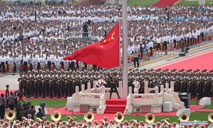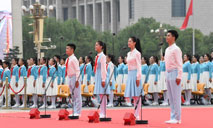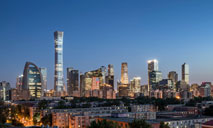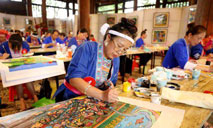African envoys defend China on Xinjiang, say ‘no visit, no say’
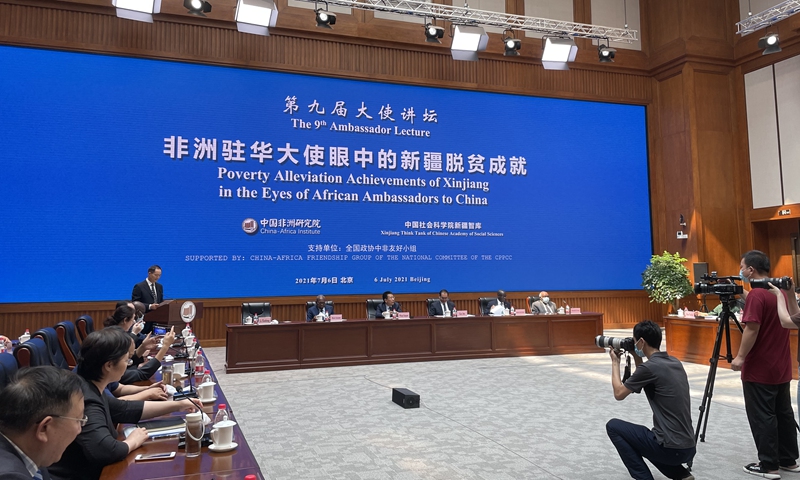
Ambassadors and diplomats of African countries attended a forum in Beijing on July 6 to share their stories of visiting Northwest China's Xinjiang Uygur Autonomous Region and their understanding of the poverty alleviation achievements in the region. Photo: Liu Xin/GT
Ambassadors and diplomats of African countries attended a forum in Beijing on Tuesday to share their stories of visiting Northwest China's Xinjiang Uygur Autonomous Region and their understanding of the poverty alleviation achievements in the region, criticizing some Western countries and the US for hyping untenable accusations against Xinjiang and even escalating their smears to so-called "genocide" in an attempt to thwart China's development.
Four ambassadors and diplomats from Guinea-Bissau, Zimbabwe, the African Union and Namibia attended the 9th Ambassador Lecture themed "Poverty Alleviation Achievements of Xinjiang in the Eyes of African Ambassadors to China" hosted by the China-Africa Institute and the Xinjiang Think Tank of the Chinese Academy of Social Sciences.
Guinea-Bissau Ambassador Antonio Serifo Embalo to China said he visited many cities in Xinjiang in May, including Urumqi, Aksu Prefecture and Kashi Prefecture and talked to villagers to learn their views on the relations of ethnic groups.
Xinjiang's problems are not what the West said on human rights or religion, or relations of ethnic groups. They are about fighting terrorism and extremism. Since 1990, the region had suffered from several thousands of violent incidents, and religious extremists and overseas separatists trying to split the region from China are behind these attacks, the ambassador said.
Embalo also talked about the inflammatory topic of "forced labor" in cotton-related industries in Xinjiang, saying that the hype is untenable as he has learned from his visit the high mechanization rate in cotton planting and harvesting. Local governments' subsidiaries helped increase the purchase of machines.
"Some developed countries criticized China for using forced labor in the cotton industry, which is not true and is not what we saw in Xinjiang. When we left Xinjiang, we believe that the only fight in Xinjiang is the government's battle against extremists planted by overseas separatists in the region," said the ambassador.
The cotton and PV industries in China's Xinjiang are successful and the US, and the West's attack under the banner of human rights would deprive local residents of the opportunity to improve their income and live better lives, Zimbabwe Ambassador Martin Chedondo said.
These countries' double standards on human rights are clear and in facing their criticism of China on these issues, Zimbabwe has stood firmly with China, Chedondo said, noting that his country signed the joint statement supporting China's stance on Xinjiang and Hong Kong related issues at the 47th session of the United Nations Human Rights Council.
More than 90 countries expressed their support to China amid the US and a small group of countries' efforts to hype Xinjiang and Hong Kong related topics at the UN Human Rights Council.
Rahamtalla Mohamed Osman, the AU representative to China, said at the forum that the hype of Xinjiang topics by some countries is not out of human rights concerns but targets China in an attempt to suppress China's robust development, and the Chinese people should not be distracted by the noise.
Osman said that the Xinjiang region has offered the world experience on how to fight extremism by focusing on poverty alleviation work. Extremism has close ties with poverty and improving residents' life in poor areas would greatly reduce the possibility for them to be influenced by extremism.
On some Western countries' claim that China is taking advantage of Africa through cooperation, Osman said these remarks are an insult to African countries. China-African ties are strategic and solid and the cooperation is mutually beneficial.
Simon Indongo, First Secretary of the Namibia Embassy to China, said that those who did not conduct investigations have no say. The developments in China's Xinjiang have been witnessed by people that have visited it.
Aside from criticizing the US and Western countries for using human rights to attack China and other developing countries, African diplomats also expressed support to China.
African countries and developing countries will work together to support China at the UN Human Rights Council, to use the mechanism the West uses on the same platform to beat them. This is our solidarity and this is our way, said Osman.
Photos
Related Stories
Copyright © 2021 People's Daily Online. All Rights Reserved.







